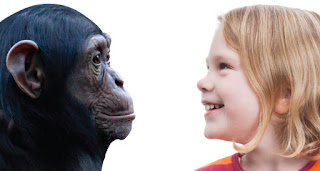[BIOLOGY | Week #3] Human & Chimp Genes + Genetic Evolution
Human + Chimp Genes and Genetic Evolution
"99.4% of the most critical DNA sites are identical in human and chimps genes"
In response to the quote above, I believe humans are either descendants of chimps or share a common ancestor. Perhaps over time, a genetic mutation occurred in a generation of chimpanzees and the human species are products of that change. Our genetic similarities to chimps can offer a useful key into understanding the biological and evolutionary traits of humans; it seems we are just scratching the surface in understanding what makes us human.
I was unable to access the link provided on human genetic evolution, but found an interesting article published by Big Think on four beneficial evolutionary mutations that humans are currently undergoing. What intrigued me is their stance on mutations as a more positive outlook on genetic evolution. For instance, there is a small community in Italy who carry a mutant version of a protein gene called Apolipoprotein AI-Milano or Apo-AIM, which is more effective than the non-mutated Apo-AI (which is a protein gene we all carry) at removing cholesterol from cells and dissolving plaque in the arteries. People who carry the mutant Apo-AIM gene have such a significant lower risk of heart attack and stroke that pharmaceutical companies are looking at making artificial versions of the "cardio-protective" drug. I continue wonder how factors such as ones physical environment, racial background, and even the historical significance of a place can alter and influence ones genes.
First Living Organism with Redesigned DNA
The molecular biology team at Cambridge University believes that redesigning the E Coli genome can be beneficial in the future for countering existing diseases and. They claim that since the designer lifeforms have different DNA, invading viruses will struggle to spread inside, essentially making them virus-resistant. There is also a possibility of creating designer enzymes, proteins and drugs. I don't know much about microbiology, but feel uncomfortable about the idea of "designing" special DNA, especially in bacteria that can potentially be harmful and cause an epidemic. This also speaks to our discussion in the development of "designer" babies in China. What is the ethical threshold in biological research when redesigning DNA in living organisms and now embryos?
First Living Organism with Redesigned DNA
The molecular biology team at Cambridge University believes that redesigning the E Coli genome can be beneficial in the future for countering existing diseases and. They claim that since the designer lifeforms have different DNA, invading viruses will struggle to spread inside, essentially making them virus-resistant. There is also a possibility of creating designer enzymes, proteins and drugs. I don't know much about microbiology, but feel uncomfortable about the idea of "designing" special DNA, especially in bacteria that can potentially be harmful and cause an epidemic. This also speaks to our discussion in the development of "designer" babies in China. What is the ethical threshold in biological research when redesigning DNA in living organisms and now embryos?




Comments
Post a Comment